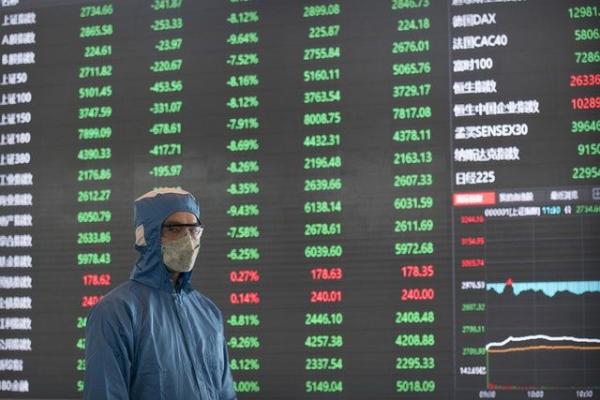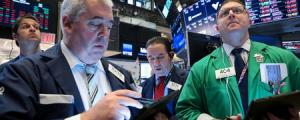The new coronavirus from China has sent shockwaves of fear around the world, but many traders are monitoring the outbreak with some trepidation, and not only out of concern for their health.
The infectious disease has killed at least 361 people and infected more than 16,600 globally, as it continues to spread beyond China. As of the time of writing, the first confirmed death outside of China has been reported in the Philippines. The World Health Organization declared the outbreak a public health emergency of international concern.
While the human cost of the coronavirus must always be foremost in our priorities, investors are rationally reacting to the potential economic impact of the new coronavirus. We break down what’s happening in the financial market, and why.
Airlines and travel
As we have previously reported, the first impact of the new coronavirus on financial markets was in the travel and tourism sector. The outbreak occurred during the Chinese Lunar New Year, a time that sees a huge level of human traffic as many travel to meet their families for festivities.
As coronavirus is transmissible from human to human, travel and transportation is being halted and slowed in an attempt to limit exposure to the infected. The US state department has warned people not to travel to China, Russia has suspended train services and closed its borders with China, and many other nations are imposing special screenings and travel restrictions as well as organising evacuations from dangerous areas.
Airlines across the world, from United Airlines to British Airways have cut flights to and from China or suspended them entirely. Flights to China account for 2%-6% of estimated revenue at United Airlines, Delta Air Lines Inc, American Airlines Group Inc and Air Canada. Overall, the US airline sector is down 7% at the time of writing.
Air traffic will likely return to normal once the health crisis subsides. But such a recovery could take many months (9 in the case of the historic SARS epidemic).
Tourism
Tourism markets, especially in countries which depend on Chinese visitors, are particularly vulnerable. Tourists spend a lot of money abroad and a drop in travel will have a substantial knock-on effect for businesses.
Travel and hospitality companies have been cancelling bookings and issued refunds, but hotels and tours won’t be the only industries affected. In 2018, around 163 million Chinese tourists accounted for nearly a third of travel retail sales worldwide. Demand for luxury goods in particular is particularly dependent on Chinese tourists.
Thailand, a popular tourist destination for the Chinese, has already reduced its 2020 GDP forecast, anticipating revenue losses of as much as $1.6 billion from 2 million fewer Chinese visitors, based on an estimation of a further three months of travel restrictions.
Chinese economy
China is the second-largest economy in the world and a global driver of growth, but analysts fear a ‘black swan’ event that could tip the country into recession. Following the difficulties of the US-China trade war, its official GDP growth in 2019 was the slowest since 1990.
Internal consumption in China is taking a big hit, with normally bustling cities like Hong Kong, Shanghai and Beijing facing empty streets and shuttered windows as stores and restaurants close. Popular chains such as Starbucks, KFC, and IKEA have closed their outlets. Expensive blockbuster movies have been delayed. Should the crisis continue into the summer, experts have projected a fall in Chinese growth to the tune of 2-4% or even lower this year.
As of the time of writing, the biggest China exchange-traded fund, iShares MSCI China ETF, is down 11%. When Hong Kong's markets reopened last week, the Hang Seng index (HSI) plunged nearly 6% in just a few days of trading. The Chinese yuan is suffering as the dollar gains, and stocks in China-dependent Taiwan and South Korea have lost 6% and 9%, respectively.
Manufacturing
Despite US tariffs, China, the ‘factory of the world’, remains a crucial element in the supply chain of many corporations, from automobiles to consumer technology. General Motors and Honda both evacuated workers from their assembly plants in Wuhan, and Toyota has halted its China production until Feb 9.
Apple’s CEO, Tim Cook, said the company is taking steps to “make up any expected production loss”, even as Foxconn, which has plants in Wuhan, issued a statement confirming that it would meet manufacturing obligations. ASUS and manufacturers of mobile accessories for Samsung have already issued warnings that some shortages on devices and accessories are to be expected.
Oil
China is a big consumer of oil and oil prices have taken a hit over the country’s economic turmoil following the virus outbreak. The large scale transportation shutdowns all over the country have put oil investors on the defensive, adjusting against a drop in demand.
Brent crude oil, the global benchmark for transport fuel, is down 13% and US oil prices have dropped to the lowest since May 2019, when the US-China trade war had undermined investor confidence. On Friday, US oil settled at $51.56 per barrel. Royal Dutch Shell, Europe’s biggest oil company, which reported a 23% drop in full-year net profit on Thursday, took a 3% hit to its shares that same morning.
‘Safe’ assets
Market uncertainty is often a blessing for traditionally safe assets like gold or government bonds. The coronavirus crisis is no exception, and gold prices climbed to their highest level since April 2013, as investors sought safety in precious metals. At the end of January, the price of gold settled at $1,582.90 an ounce. In the meantime, demand for US Treasury bonds increased, with a corresponding drop in yields.
Libertex – your ally in a shifting economy
Successful trading on the global financial market means making the right calls in the short term while building a diverse portfolio to weather shocks like the coronavirus in the long term. For beginner and novice traders alike, Libertex offers the best one-stop solution for making investments and trading assets.
Libertex is a fast, user-friendly trading platform that lets you trade on the financial market 24/7 on your smartphone or on the web. With over 20 years of financial market and online-trading experience, Libertex offers in-app trading signals and training materials from experts who have successfully played the market throughout all kinds of political and economic change.
Traders using Libertex have access to over 200 financial assets including stocks, shares in top companies, currencies, crypto, indices, oil and gas, and precious metals and more. By reacting fast to price changes, the savvy trader can come out on top even when industries are in turmoil.
Looking for the best way to profit from the changing global market? Then register with Libertex and start trading now!


